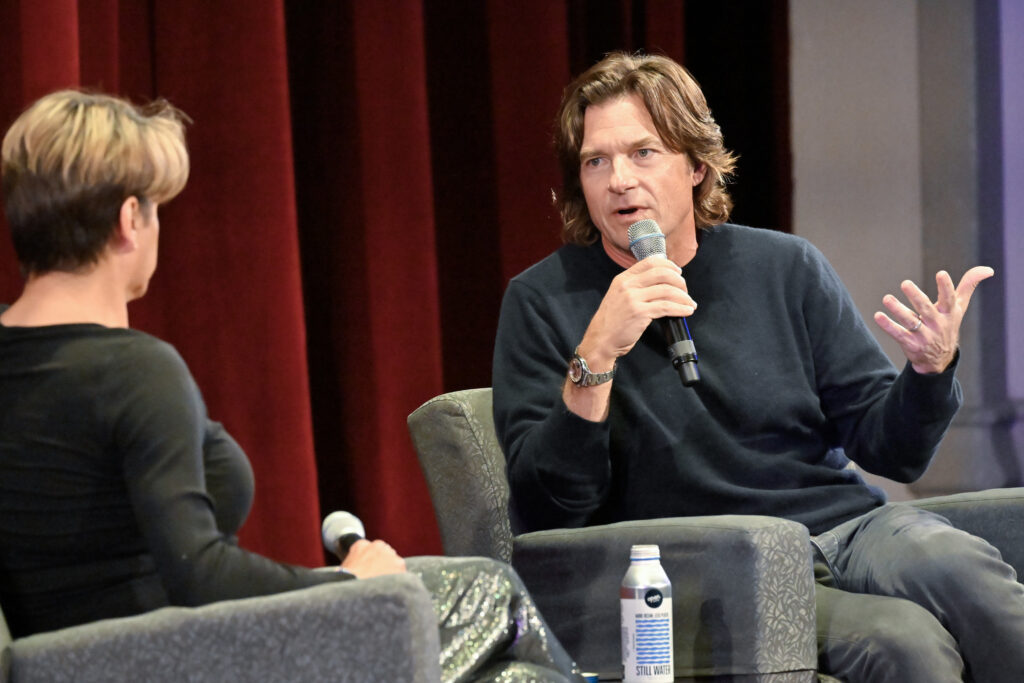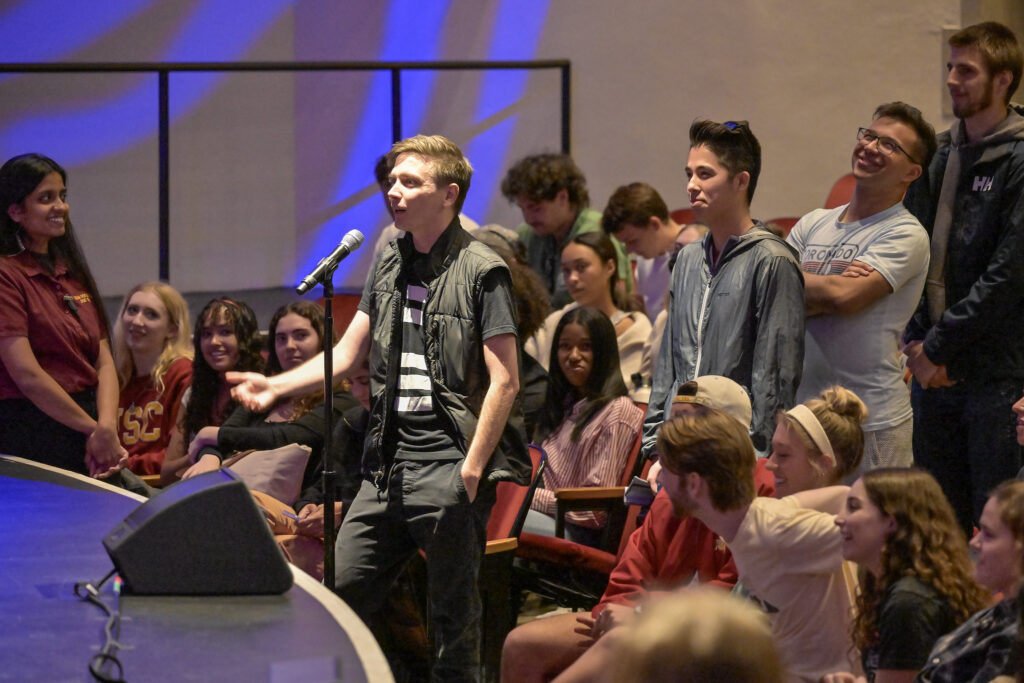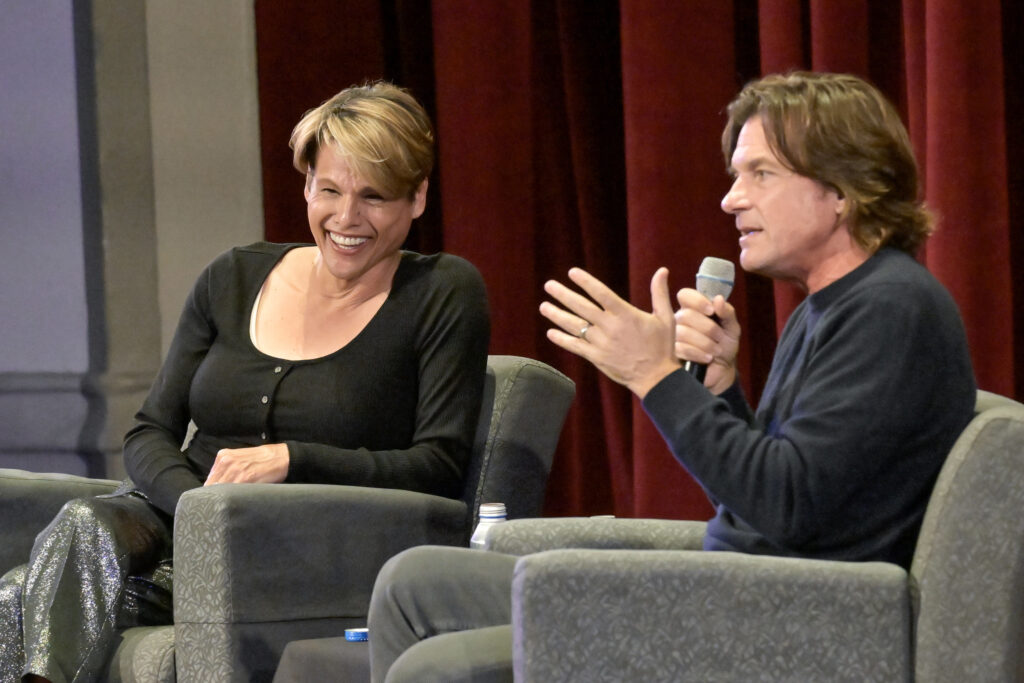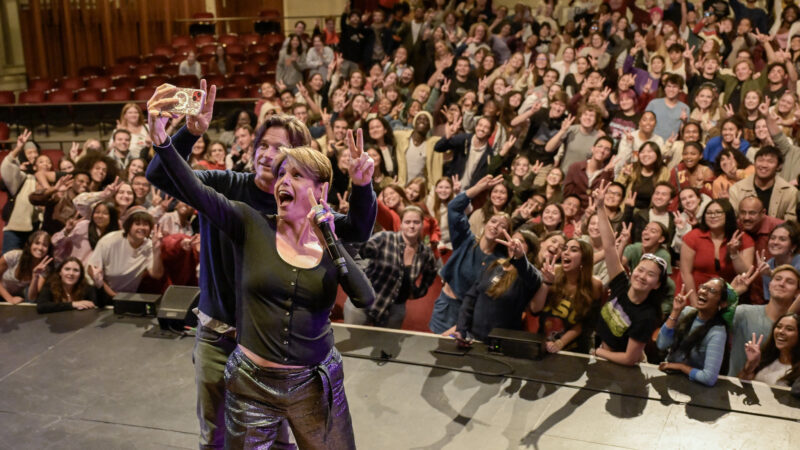In mid-November, the USC School of Dramatic Arts welcomed award-winning actor, director and podcast host Jason Bateman to the Bovard Auditorium for a discussion with SDA faculty member Alexandra Billings. Part of a classic Hollywood power couple, Bateman is married to SDA alumna Amanda Anka (BFA ’90), currently a co-producer on the Apple TV+ show The Morning Show. His career in Hollywood has spanned more than four decades, from his work as a child actor on Little House on the Prairie to directing and starring in the critically acclaimed series Ozark, and has included iconic roles in film and television hits like Arrested Development, Zootopia, Horrible Bosses and Game Night. In recent years Bateman has also found success hosting the immensely popular podcast “SmartLess” with co-hosts Sean Hayes and Will Arnett, featuring guests ranging from President Joe Biden to musical legends like Sir Paul McCartney.
“We finished the interview with Paul McCartney and then we do like a little five-minute wrap up afterwards,” Bateman recalled. “I said to Sean, how did you know Paul McCartney? He said: I don’t, he called us. So that was the first indicator that people were listening and that we might be doing it for a little while.”
“By the way, he was in a band called The Beatles,” Bateman cracked to the students.

The camera is your sibling
Professor Billings and Bateman shared stories and advice on everything from acting with Liza Minnelli and Katharine Hepburn to practical tips on auditioning and directing. Throughout the evening, Bateman displayed his characteristic wit and charm, making self-deprecating jokes and encouraging students to be resilient in the early parts of their careers.
“You need to have a sense of self and worth and talent and uniqueness that you know is not right for everything. It’s perfect for a few things,” Bateman said. “There are no guarantees. It’s not predictable. It’s kind of why we’re attracted to this business.”
Bateman discussed tips for acting for stage, film and television, comparing acting to convincingly listening to a boring story from one’s grandmother at Thanksgiving.
“She might be easy to convince,” Bateman said. “But your sibling is sitting there too. And your sibling knows when you’re full of it. The camera is your sibling.”
Bateman also drew on his experience as a director, giving advice on handling actors who were having difficulty with a role and on viewing the casting process from the other side of the camera.
“First of all, you assume they’re doing the best job they possibly can,” Bateman said. “We all get small and tight when we don’t feel like we’re good at something. You’re going to get the best out of somebody if they have confidence.”
Professor Billings asked Bateman about the growing diversity and changing culture in Hollywood, indicating the diverse young actors just entering the industry in the audience. Bateman called the changes “long overdue” and advocated for programs to help young artists of color gain experience in the film industry.
“I’m an advocate of creating a shadow program whereby folks like you just get to go hang out on a set for a week,” Bateman said. “The mystique is destroyed immediately.”

Be vulnerable, be honest, be you
Students took the opportunity to ask Bateman for behind-the-scenes stories about their favorite movies and television shows, including working with Charlie Day in Horrible Bosses, what it felt like to experience a new generation discovering Arrested Development twenty years after it originally aired and engaging in voicework for Zootopia. Mention of the latter film sent the audience into a frenzy, prompting Bateman to chuckle.
“So that’s how old you guys are,” he laughed. “You’re way too young for Arrested Development, but you’re perfect for Zootopia.”
Bateman displayed an extraordinary amount of generosity with his storytelling and advice, addressing student questions with thoughtfulness and humor. He fielded student questions even after the allotted time had run out and drew from his years of experience as a multihyphenate to address a wide range of topics, from the process behind choosing guests for “SmartLess” to injecting subtlety into dramatic scenes in Ozark.
“We have this great moment where I simply open up the fridge for Laura Linney and we share this little look,” Bateman said. “It’s caught from a long lens across the room with some foreground traffic. And you just barely see that small look. It’s a really elegant way to say they’ve made up. He loves her. She loves him. And they didn’t cheapen it by saying the words.”
Bateman talked about being the straight man in most of his movies, rather than a character actor, describing it as a different type of acting from actors like Christian Bale and Daniel Day Lewis. Professor Billings disagreed that character acting was more difficult, praising Bateman for his extraordinary believability as a “regular guy” in many of his roles.
“I think that we all know this as actors, that there is an art to being able to tell the truth and be believed,” Professor Billings said. “I think that skill is extraordinary.”
“A lot of that is trusting that the camera is watching,” Bateman responded. “Which is another way to say you’re going to be watching.”

Bateman took a moment to praise the program and express his admiration for the young artists studying at USC.
“By the way, you guys are so lucky you go to this school,” Bateman said. “I grew up in this city. I was two finals short of a high school diploma, so I didn’t even finish high school. But had I finished high school, USC was the spot.”
Professor Billings ended the evening with a series of rapid-fire questions, asking Bateman for short answers ranging from his favorite dessert (“I enjoy a nice cobbler.”) to what piece of advice he would give to his younger self. The latter question prompted a touching story about meeting Ron Howard, executive producer on Arrested Development, and being blown away by his kindness and authenticity. Bateman said that the lesson found him at the right time.
“What I would say to my younger self is: be vulnerable, be honest, be you,” he said.
He advised young artists to allow themselves to be kind without fearing that it will be read as weakness, and to be vulnerable and authentic in their work and dealings with others.
“It’s okay to just be kind, to be nice, to be real,” he said, throwing in: “It also helps with the acting.”
